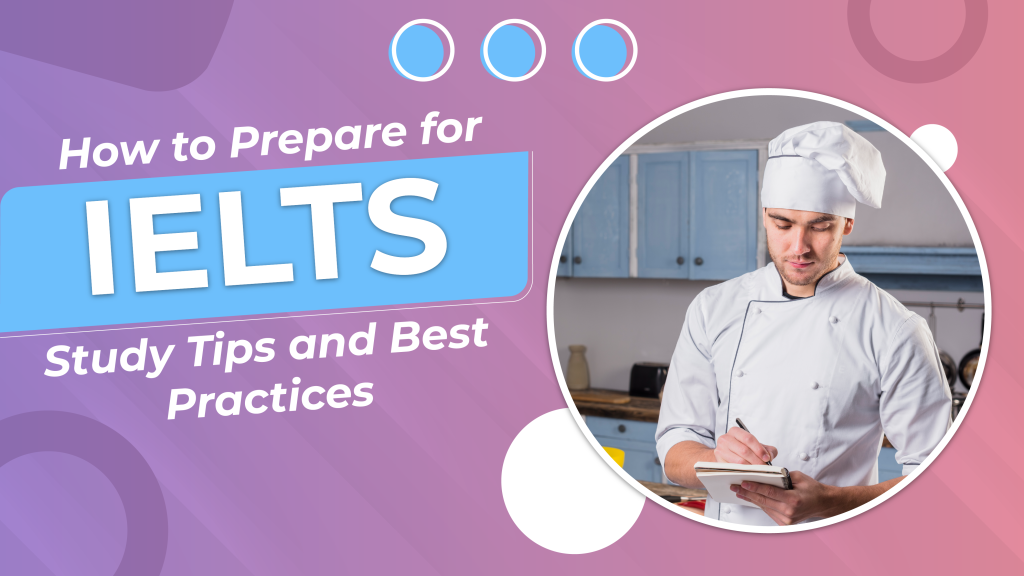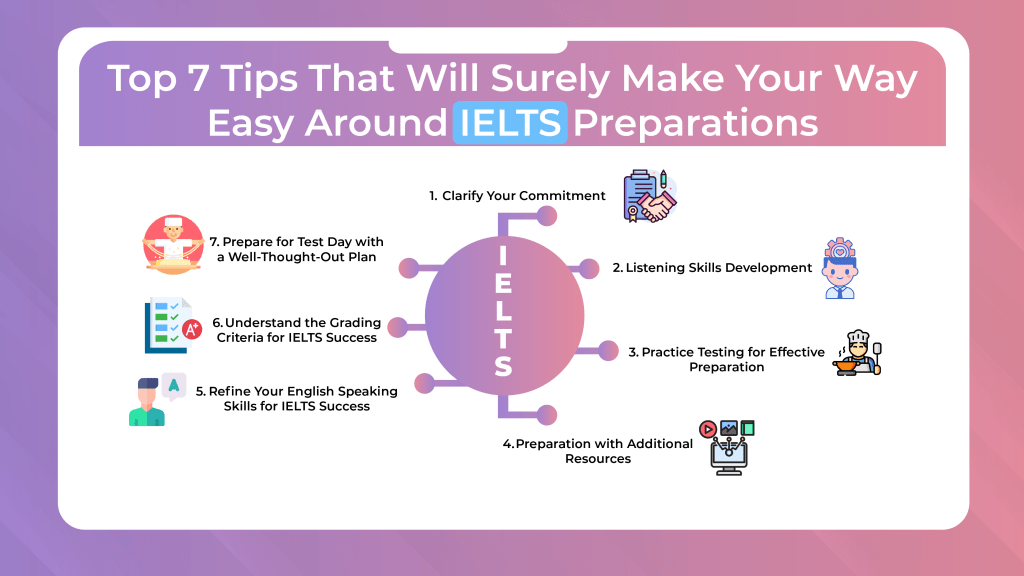
How to Prepare for IELTS? Study Tips and Best Practices
The IELTS, also known as the International English Language Testing System, currently stands as the world’s most widely recognized English language examination. Various entities, including universities, immigration departments, governmental bodies, and multinational corporations, mandate individuals learning English as a second language to demonstrate their proficiency based on the rigorous criteria set by the IELTS.
Conquering this test proves to be no simple feat. Beyond effective English communication skills, mastering a range of strategic test-taking techniques becomes essential. However, navigating the challenges of attaining your desired IELTS score need not be an exasperating journey. This article will discuss the key IELTS exam Tips for successful preparation, offering numerous links to support resources.
EXPLORE JOBS ON KHAANSAMA
Top 7 Tips That Will Surely Make Your Way Easy Around IELTS Preparations

Here are some of the best IELTS Tips for beginners that can help you throughout the preparations:
1. Clarify Your Commitment
Prior to registering for the IELTS, consider what the undertaking entails. Research is critical on one’s side in making a confirmation of one’s test booking. Consider the following tips before you start:
Test Format Preference: Choose between a paper or computer-based IELTS. They both administered at examination center. For some people it is easier to opt for the paper-based version as not to get behind if they are not proefficient with keyboards, for others its the opposite way – some people consider that answer selection and typing takes less time on a computer.
Information regarding these elements of testing will guarantee you make informed decisions that align with your specific preferences hence making your experience more smooth.
Academy or General Coaching: Decide if the IELTS Academic or IELTS General Training is ideal for you. The IELTS academic test is appropriate for individuals applying to courses in an English setting, and the IELTS general training test is applicable for persons who need day to day English language skills at work or for immigration purposes.
The content of a general writing examination might include various forms of writings such as emails, articles, news and other types of day-to-day writings. Be mindful that if you are migrating to the UK, you will have to sit a different form known as the UKVI IELTS.
Timing: Consider the time you’ll need to study for a satisfactory IELTS score. Begin by establishing the IELTS score required by your target organization, typically falling between 6 and 7 on the scale, equivalent to B2 to C1 on the CEFR scale. If you know your CEFR level, you can estimate your likely IELTS score without much difficulty.
Most English schools recommend a minimum of 6 months to enhance a student’s English level by 0.5 to 1 band score. Therefore, if you’re not yet conversationally fluent in English, focus on improving your general language skills before diving into test preparation.
2. Listening Skills Development
For the IELTS Listening test, honing your listening abilities is crucial. In Part 1 and Part 3, where multiple speakers are involved, it’s beneficial to practice with diverse dialogues, like those found in Web shows or Podcasts.
On the other hand, Section 2 and Section 4 feature only one speaker, making short video lectures an effective practice method. Keep in mind that Part 2 and Part 4 typically last around 5-7 minutes, so it’s advisable to choose practice materials of similar duration. This approach ensures a targeted and relevant preparation for the test.
3. Practice Testing for Effective Preparation
Start your planning by trying a sample test that will help you make evaluation on yourself on whether which subject your are better and which needs work. For instance you are good at listening but lack behind reading, then you should focus more on reading with the help of books or blogs. The comprehension in this IELTS reading tips and tricks will help you assess where you stand and identify your strong and weak aspects.
You may need to improve on your weak areas, but don’t totally forget that you should also work on sharpening your existing strengths as these form the bedrock for effective preparation towards the subsequent test.
Furthermore, it is sometimes hard to see one’s own blunders. Therefore, assistance from an expert becomes necessary in this case. One of the easiest ways that many test-takers can consider include taking IELTS prep training courses that are customized to make you ready for IELTS through addressing your weaknesses and enhancing your strengths.
4. Preparation with Additional Resources
For additional support, explore IELTS test prep live streams on platforms like YouTube. While not as targeted as a formal course, these streams can still provide helpful insights.
If access to an IELTS prep course is challenging, participating in an English language course on YouTube or Facebook is a beneficial alternative. You can also follow podcasts and roundtables that are available online with YouTube, Spotify, and on OTT platforms like Netflix.
5. Refine Your English Speaking Skills for IELTS Success
Coming to IELTS tips and tricks for Speaking, Dedicate regular time to practicing your English speaking skills, as it significantly contributes to your success in the IELTS speaking portion. Despite taking only 11 to 14 minutes, this section involves continuous interaction with the examiner. You’ll respond to general questions about yourself, receive a card with a topic, and have 2 minutes to prepare and 1 to 2 minutes to speak on the given topic. The examiner then follows up with additional questions on the same topic.
To excel in this part of the IELTS, consistent speaking practice is crucial. You can achieve this by:
● Engaging in conversations with native English speakers.
● Practicing with fellow learners of English.
● Joining an English study group for collaborative learning and practice.
These efforts not only enhance your communication skills but also better prepare you for the dynamic interactions required during the IELTS speaking test.
6. Understand the Grading Criteria for IELTS Success
To score well on any test, one needs to know what a good answer means. IELTS Assessment Criteria would serve as your guideposts and you will use this a basis of your answers. The understanding of these measures is essential since they constitute what counts, which you can leverage in your direction by improving your pitfalls. In the writing and speaking tests, where evaluation is done largely subjectively, this is especially important.
Search for some example answer online, but make sure you use trusted sites. Commence with searching relevant texts within the authorised IELTS exam boards’ sites as well as in recognized handbooks, which provide trustworthy examples of questions and subjects with their score weightage.
Keep in mind that a unique aspect of this test is the expectation that you might make mistakes. Both individuals aiming for a band 4 and those aiming for a band 8 take the same exam. Part of understanding the grading criteria is learning how many mistakes you can afford to make. For instance, if targeting a band 6 in the academic reading test, you only need 23 correct answers out of 40, offering a reassuring perspective on the process.
7. Prepare for Test Day with a Well-Thought-Out Plan
Facing any test can be quite daunting, and regardless of how much you’ve prepared, a significant part of your success hinges on how you feel on the actual day. Being in the right mindset is crucial for tackling an exam, and familiar advice about managing logistics remains relevant.
● Before your test day, it’s essential to read and understand the IELTS test terms and conditions. These critical details can be found in the Test Takers Information section of your application form.
● During the test, remember that you are not allowed to bring food or drink into the test room, except for water in a transparent bottle. Ensure you have a substantial meal before your test to keep you energized.
Consider the following points for effective test day planning:
● Essentials to Bring: Do not forget to carry along the ID (that you have given the copy of during form filling). Please be informed that there is a ban on wearing watches.
● Last-Minute Preparations: Determine whether to flip through study notes in just one minute as you walk into the exam or sit down and chill for a bit while, whichever calm your nerves.
The above factors go into a holistic plan that puts your body and mind in shape to meet the demands of test day.
Conclusion
The preparation for the IELTS must be well planned out. Essential initial steps include grasping the implications of commitment, selecting best suitable test formats, and identifying which academic or generalized guidance is more aligned with your aspirations. Good preparations entail enhancing listening skills, doing practice tests, as well as using more resources.
Continuous practice in speaking skills, understanding how grade is computed and prepared, and planning on facing the test day challenge also improve the chances of success in the exam. Through tenacity and holistic approach, overcoming the intricacies of IELTS can be feasible and comforting experience.